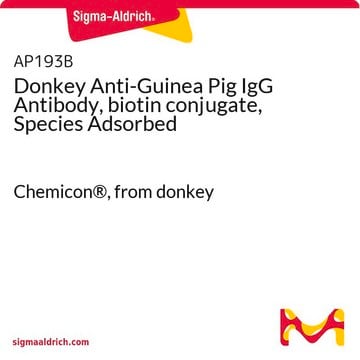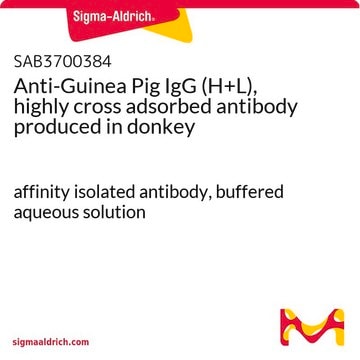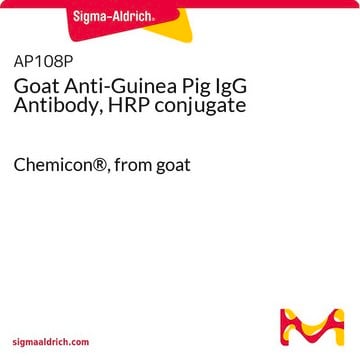AP193F
Donkey Anti-Guinea Pig IgG Antibody, FITC conjugate, Species Adsorbed
Chemicon®, from donkey
Sign Into View Organizational & Contract Pricing
All Photos(1)
About This Item
UNSPSC Code:
12352203
eCl@ss:
32160702
NACRES:
NA.46
Recommended Products
biological source
donkey
Quality Level
conjugate
FITC conjugate
antibody form
F(ab′)2 fragment of affinity isolated antibody
antibody product type
secondary antibodies
clone
polyclonal
species reactivity
guinea pig
manufacturer/tradename
Chemicon®
technique(s)
immunofluorescence: suitable
shipped in
wet ice
target post-translational modification
unmodified
Application
Research Category
Secondary & Control Antibodies
Secondary & Control Antibodies
Research Sub Category
Secondary Antibodies Adsorbed for Dual Labeling
Secondary Antibodies Adsorbed for Dual Labeling
This Donkey anti-Guinea Pig IgG Antibody, FITC conjugate, Species Adsorbed is validated for use in IF for the detection of Donkey Guinea Pig IgG.
Legal Information
CHEMICON is a registered trademark of Merck KGaA, Darmstadt, Germany
Disclaimer
Unless otherwise stated in our catalog or other company documentation accompanying the product(s), our products are intended for research use only and are not to be used for any other purpose, which includes but is not limited to, unauthorized commercial uses, in vitro diagnostic uses, ex vivo or in vivo therapeutic uses or any type of consumption or application to humans or animals.
Not finding the right product?
Try our Product Selector Tool.
Hazard Statements
Precautionary Statements
Hazard Classifications
Aquatic Chronic 3
Storage Class Code
11 - Combustible Solids
WGK
WGK 3
Certificates of Analysis (COA)
Search for Certificates of Analysis (COA) by entering the products Lot/Batch Number. Lot and Batch Numbers can be found on a product’s label following the words ‘Lot’ or ‘Batch’.
Already Own This Product?
Find documentation for the products that you have recently purchased in the Document Library.
Rosario Amato et al.
Investigative ophthalmology & visual science, 62(9), 9-9 (2021-07-08)
Glaucoma is a multifactorial disease, causing retinal ganglion cells (RGCs) and optic nerve degeneration. The role of diabetes as a risk factor for glaucoma has been postulated but still not unequivocally demonstrated. The purpose of this study is to clarify
Rosario Amato et al.
Translational vision science & technology, 12(11), 6-6 (2023-11-02)
Glaucoma is an eye-brain axis disorder characterized by loss of retinal ganglion cells (RGCs). Although the role of intraocular pressure (IOP) elevation in glaucoma has been established, the reduction of oxidative stress and inflammation has emerged as a promising target
CXCL14-like immunoreactivity in somatostatin-producing cells of the Japanese quail (Coturnix japonica) pancreas.
Suzuki, et al.
Anatomia, Histologia, Embryologia, 52, 158-162 (2023)
An appraisal of intermediate filament expression in adult and developing pancreas: vimentin is expressed in alpha cells of rat and mouse embryos.
Di Bella, A; Regoli, M; Nicoletti, C; Ermini, L; Fonzi, L; Bertelli, E
The journal of histochemistry and cytochemistry : official journal of the Histochemistry Society null
Guo-Du Wang et al.
American journal of physiology. Gastrointestinal and liver physiology, 304(10), G855-G863 (2013-03-23)
Serotonin [5-hydroxytryptamine (5-HT)] is released from enterochromaffin cells in the mucosa of the small intestine. We tested a hypothesis that elevation of 5-HT in the environment of enteric mast cells might degranulate the mast cells and release mediators that become
Our team of scientists has experience in all areas of research including Life Science, Material Science, Chemical Synthesis, Chromatography, Analytical and many others.
Contact Technical Service








